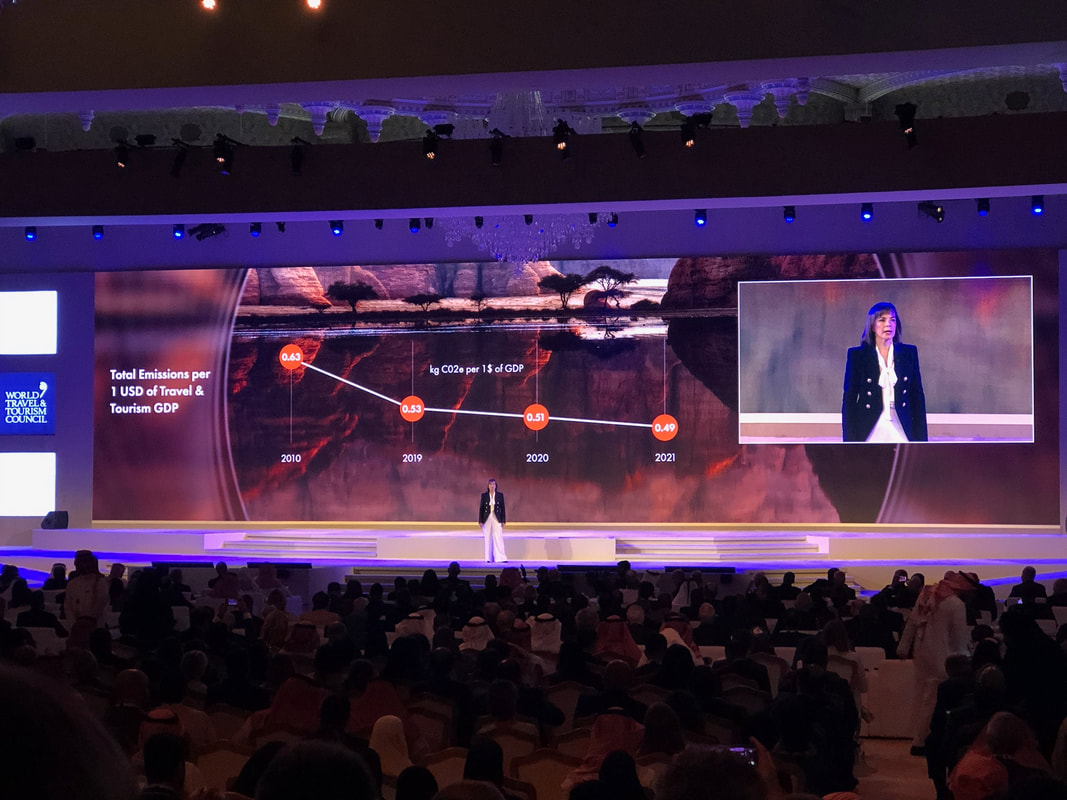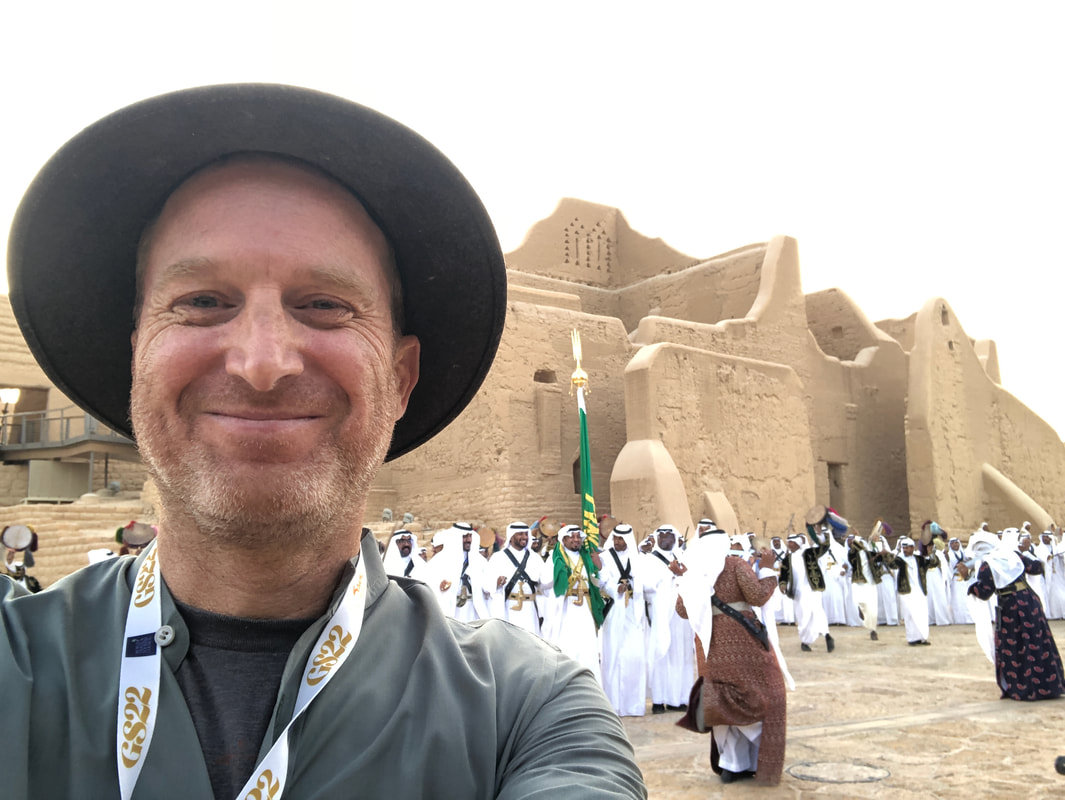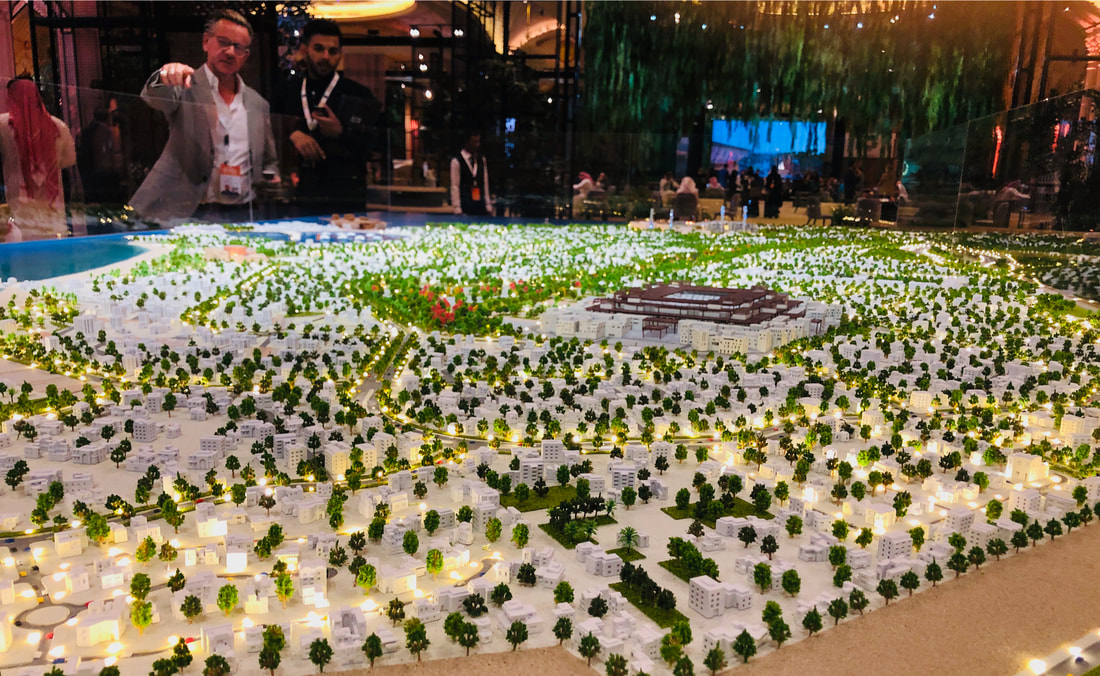|
Two hundred and fifty CEOs, fifty-two ministers of tourism, three hundred travel journalists, and nearly three thousand professionals have gathered to redefine tourism in the post-pandemic era, selecting a rather controversial venue for the occasion. The annual World Travel and Tourism Council (WTTC) Global Summit has also attracted movie stars like Edward Norton, prominent international TV anchors and a spattering of supermodels, some of whom no doubt shared my unease flying into Riyadh, Saudi Arabia. With its torrid reputation for human rights and on-going diplomatic spat with Canada, friends and family were genuinely concerned for my well-being. Despite the kingdom’s attempt to reinvent itself as a tourism mecca guided by the vision of its millennial Crown Prince, travel advisories cautioned me to log out of social media apps, avoid government buildings, and adhere to strict local customs. My wife also advised me to please keep my mouth shut, knowing full well I have an inherent incapacity to do so. Supplied with a new Saudi tourist visa and with an invitation for the conference, I had no idea what to expect. I didn’t need pyro-drones topping off a multi-million-dollar fireworks show to witness Saudi Arabia’s eye-boggling investment in tourism. It was immediately evident pulling up to Riyadh’s palatial Ritz Carlton Hotel and Conference Centre. The production values of the WTTC event were staggering, along with impressive showcases for Saudi Arabia’s four high-profile giga-projects – developments that aspire to create entire cities out of thin air. The CEOs of Marriott, Hilton, Carnival, Accor, Hertz and Hyatt were on stage, along with dignitaries from Portugal, Austria, South Africa, Costa Rica, the USA, the UK and Australia. CNN’s combative host Richard Quest grilled them about how the tourism industry intends to pay more than just lip service to sustainability, a major theme throughout the two-day conference. With great fanfare, the WTTC released the first-ever report to measure tourism’s impact on global carbon emissions. The conclusion is that airfare, hotels, cruises and the like account for 8.1%, less than the previously estimated 11%. Reporters questioning the report’s methodology were reassured that the numbers would be scrutinized by governments and NGOs around the world. After the scourge of over-tourism and the challenges Covid, a revitalized industry is taking responsibility seriously. Buzz words and catchphrases flowed thick and fast: community engagement, greenwashing, decarbonization, revenge tourism, zero gravity urbanism, follow the data with next generation artificial intelligence. “We are not in the service industry, we are in the care industry,” said Hyatt Hotels CEO Mark Hoplamazian. Above all, there was a lot of overall optimism. Despite a labour crisis, inflation, China’s iffy recovery and the tragic war in Ukraine, global tourism’s pandemic recovery has been faster and fiercer than anyone expected (Destination Canada revised and shortened its own tourism recovery projections too). Demand is quite simply outstripping supply, bringing with it opportunities and issues. Former UN Secretary General Ban Ki-moon voiced his frustration that government climate initiatives were lagging, supermodels Elle McPherson and Adriana Lima launched new Awards for Sustainability, the WTTC released various economic reports, and multiple newsworthy deals and announcements were made. Corporate tourism is a massive industry so I won’t bore you with the details, but it was hard to ignore the rather large elephant in the room. An elephant called Saudi Arabia. “I want women in Canada to know that our lives here are not what they think our lives are,” explained Alhanouf Aldrees, a cultural manager at Riyadh’s spectacularly restored Diriyah UNESCO World Heritage Site. I’d made a point to engage with as many Saudis as I could, asking thorny questions so I could hear their side of the story. What they shared left me in little doubt that the country is experiencing neck-bracing social change, reminding me of how quickly everything transformed when I lived through the fall of Apartheid. Saudi Arabia’s Crown Prince Mohammed Bin Salman (popularly known as MBS) is smashing traditions with an iron fist, breaking both glass ceilings - and political opponents - in his goal to modernize and restore his kingdom after decades of conservative religious isolation. Supported by Ivy League-educated staff and enjoying widespread domestic support from a youthful population, MBS wants to spearhead a new global economic landscape. You’ve likely heard about the plight of Saudi women, the persecution and murder of Saudi opposition (including a prominent US-based Saudi journalist in grisly fashion), the brutal proxy war in Yemen, mass beheadings of local activists, and the infamous 2017 Royal purge that took place in the same Ritz Carlton hosting the WTTC event. You probably have not heard about the legal reforms assuring Saudi women of their independent right to drive, work, remove their abaya, marry, divorce and travel. We don’t hear how hardline religious authorities have been stripped of their influence and power, or that MBS has denounced the hardcore Wahhabism that Saudi Arabia has traditionally used to promote Islamic extremism. We certainly don’t hear much about Saudi Arabia’s striking skyscrapers and sprawling neon malls, busy late-night highway traffic and massive shopping palaces. The news doesn’t cover MDL Beast Soundstorm, an annual desert concert that attracts more than two hundred thousand people from around the globe (this year headlined by Bruno Mars, Post Malone and a dozen electronica superstars). Did you know that this year’s Red Sea Film Festival in Jeddah screened LGBTQ+ movies, celebrated women in cinema, hosted a conversation with Spike Lee, promoted movies that challenged Islamic practices, and claimed zero censorship? Cinemas were unbanned just five years ago, and yes, homosexuality is still illegal. I’m struggling with the contradictions too, but before you fire up your outrage, consider speaking to the people who live here. Tourism has always transcended politics and media. “If Saudi Arabia reaches out,” WTTC CEO Julia Simpson tells me, “our job in tourism is to reach back.” This is why WTTC members are investing around US$10.5 billion into the country, opening major hotels, resorts, air routes, cruise terminals and dozens of commercial developments. Princess Haifa Al Saud, the kingdom’s impressive Vice Minister of Tourism, says that one hundred thousand Saudis are being trained in hospitality to work in fully sustainable resorts. It is Dubai all over again, employing the latest technology, and doubling down on ambition. The four giga-projects are too mind-boggling to get into too much detail. A 170 km-long, 500m-high, 200m-wide mirrored skyscraper city for nine million people? Watch the promo video for The Line and I dare you not to gasp. There are massive tourism developments on the Red Sea, in Riyadh, and in the rocky desert of AlUla. Neom’s Ewok-fashioned ski resort, Trojena, looks like something out of a science fiction movie, and all of it boasts “next generation AI” so as to be “fully sustainable” with “cutting-edge design” from “the world’s leading architects.” If you build it, they will come, and the Saudis are building big, spending an estimated US$1 trillion to build a global tourism economy, and increase its non-oil GDP from 16% to 50% within a decade. The world’s largest desalination plants water the desert, and the world’s largest airport (under construction) hopes to welcome 100 million visitors by 2030 - all paid for by the world’s second-largest oil reserves. And here lies the elephant in the room. Pumping millions of barrels of oil to pay for sustainable mega-projects, admirable as they may be, does little to mitigate global climate change. Climate scientists are imploring nations to keep the carbon in the ground, including Canada, which has the world’s third largest oil reserves. I cannot help but wonder if Saudi Arabia’s jaw-dropping showcase developments – built by migrant workers in the scorching desert heat – might end up serving the mega-rich as escape pods for climate disaster. At Riyadh’s wild exhibition for The Line, I ask a proud guide who will clean the dishes, or pick up the garbage. “There will be no blue-collar workers here,” he replies. What about crime? “There will be no crime in The Line.” Next generation AI and robots will take care of all of it. Stop me if you’ve heard that one before. The line between utopia and dystopia feels very thin indeed. “Travel is all about faces, not places,” says my cheerful Riyadh guide Ali, and he’s right. Plenty of mega-developments across the Middle East look to redefine the region in a post-oil future, but it’s the Saudis themselves who offer something truly unique. Their warm hospitality is genuine and delightful. I experience “welcome welcome!” everywhere, accompanied by smiles, handshakes, curious questions, and gratitude for visiting. I relish the fragrant, blonde Saudi coffee served with sweet dates at every entrance, enjoying the smell of exotic spice in the desert breeze. Locals insisted on buying me a $20 mocktail at a Jareed Hotel bar, although bar is the wrong word. Alcohol remains strictly illegal in the kingdom, a major hurdle if the kingdom hopes to attract legions of international holidaymakers. One step at a time. I end up speaking to almost a dozen local women in Riyadh and the coastal city of Jeddah, admittedly a small sample size, but I have drawn conclusions from fewer interactions before. These women were highly educated (tertiary education is free) and well-travelled, staking out prominent positions in politics, culture and business, stepping into the light with their new-found legal independence. A minority of Saudi ‘liberals’ are dispensing with religious traditions altogether, adopting modest western clothing, although still adhering to rules like separate recreational areas. Most continue to embrace Islamic traditions and culture with great pride and surprising flexibility within the Koran’s interpretative framework. One asks me: “Why do women in Canada feel they can speak for my rights? Why do they think I’m oppressed? Do they know my life?” Even with the best intentions, we can’t claim to always know what is in someone else’s best interest, especially if we don’t engage and listen to them first.
As for the WTTC Global Summit, any event that brings together such a diverse group of people, cultures, companies and ideas can only be a good thing. Tourism breaks down stereotypes, facilitates dialogue, promotes engagement, and builds on generous hospitality. Next year the WTTC Global Summit is in Rwanda, another country with a problematic past, and tremendous tourism potential. If the world reaches out, we should always reach back.
0 Comments
|
Greetings.
Please come in. Mahalo for removing your shoes. After many years running a behemoth of a blog called Modern Gonzo, I've decided to a: publish a book or eight, and b: make my stories more digestible, relevant, and deserving of your battered attention. Here you will find some of my adventures to over 100 countries, travel tips and advice, rantings, ravings, commentary, observations and ongoing adventures. Previously...
July 2024
Categories
All
|





 RSS Feed
RSS Feed

